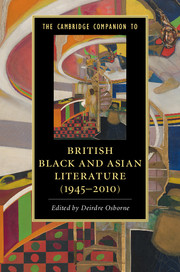Book contents
- Frontmatter
- Dedication
- Contents
- Contributors
- Acknowledgements
- Timeline
- Introduction
- PART I TRACES AND ROUTES
- PART II TRANSLOCATIONS AND TRANSFORMATIONS
- PART III RESTORATIONS AND RENOVATIONS
- 7 Recalibrating the Past: The Rise of Black British Historical Fiction
- 8 Black Women Subjects in Auto/biographical Discourse
- 9 British Black and Asian LGBTQ Writing
- 10 The Poetics and Politics of Spoken Word Poetry
- 11 Post-colonial Plurality in Fiction
- PART IV NATIONAL, INTERNATIONAL, TRANSGLOBAL
- Further Reading
- Index
- Series list
9 - British Black and Asian LGBTQ Writing
from PART III - RESTORATIONS AND RENOVATIONS
Published online by Cambridge University Press: 05 September 2016
- Frontmatter
- Dedication
- Contents
- Contributors
- Acknowledgements
- Timeline
- Introduction
- PART I TRACES AND ROUTES
- PART II TRANSLOCATIONS AND TRANSFORMATIONS
- PART III RESTORATIONS AND RENOVATIONS
- 7 Recalibrating the Past: The Rise of Black British Historical Fiction
- 8 Black Women Subjects in Auto/biographical Discourse
- 9 British Black and Asian LGBTQ Writing
- 10 The Poetics and Politics of Spoken Word Poetry
- 11 Post-colonial Plurality in Fiction
- PART IV NATIONAL, INTERNATIONAL, TRANSGLOBAL
- Further Reading
- Index
- Series list
Summary
In Samuel Selvon's watershed novel The Lonely Londoners (1957), the character ‘Captain’, in finding himself at a loss for a girl, decides to take home a woman described as ‘hustling there, dress up nice, wearing fur coat, and every time when the boys pass she saying “Bon soir” in a hoarse voice’. Days later, the Captain's bar buddies discover that ‘this “Bon soir” woman’ was not one at all, but actually ‘a test who used to dress up like a woman and patrol the area’. Selvon's comic use of transsexuality to parody the sexual peccadilloes of his avowedly heterosexual male characters, Captain and Moses, comprises a significant literary point in the ur-history of sexuality and race in Britain. Although the representation is comical, it introduces black men encountering alternative genders and sexualities within the novel's resolutely heterosexual framework.
The possibility of alternative modes of sexual expression in racially marked communities, brought up (though foreclosed) by Selvon in 1957, are realities more overtly articulated, some decades later, by Lesbian Gay Bisexual Transgender Queer poets, novelists and dramatists of Asian, African and Caribbean descent in Britain. The meta-context of hetero-normativity and hegemonic whiteness is challenged both creatively and critically in LGBTQ representations by writers including Barbara Burford, Hanif Kureishi, Maud Sulter, Jackie Kay, Luke Sutherland, Suniti Namjoshi, Dorothea Smartt, Seni Seneviratne and Bidisha. Their work forms an aesthetic legacy of LGBTQ perspectives – whether or not these are centralised in individual texts, or are by people who might not personally identify as such. While a number of these writers also wrote for the theatre, playwrights Jacqueline Rudet, Valerie Mason-John, Rikki Beadle-Blair, DeObia Oparei, Ash Kotak and Ayub Khan-Din brought representations of gay sexuality to the fore in the liveness of the stage environment. In doing so, they reinforced a presence in a cultural arena that traditionally sidelined or ignored Britain's racial and ethnic diversity, even as it increasingly accommodated queer theatre. Through their critical writing, Kobena Mercer, Pratibha Parmar, Sara Ahmed and Rohit K. Dasgupta have developed cultural commentary and theoretical frameworks within which the agencies of LGBTQ works can be better recognised and analysed. Thus, creatively and polemically these writers and thinkers reclaim perspectives previously hidden from view in culture (and historically persecuted), to rewrite and liberate expectations of sexuality and textuality through examining race and its significances.
- Type
- Chapter
- Information
- Publisher: Cambridge University PressPrint publication year: 2016
- 2
- Cited by



